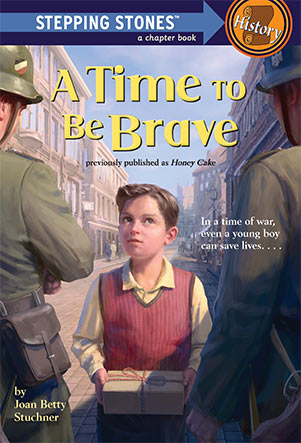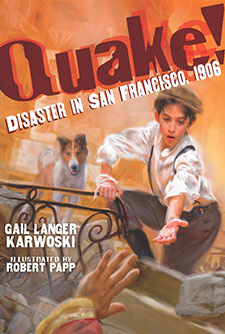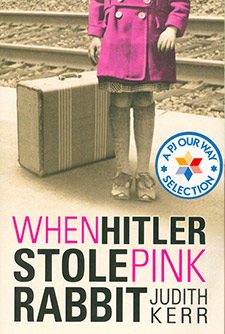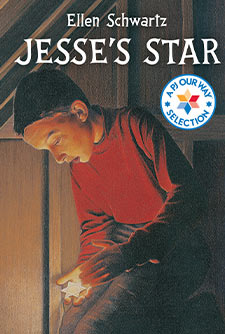A Time to Be Brave
Denmark is our country, not theirs! So what are these German soldiers doing here, acting like they own the place? Lucky for me, they don’t pay much attention to ten-year-olds…
Average Rating
( hint: Login to leave a review! )
109 Reviews
Leave Review
What the Book is About
Jewish Content & Values
Positive Role Models
Content Advisory
Talk It Over!
More for You
Ten-year-old David and his family live in Copenhagen in 1943, three years into the Nazi occupation. Life is complicated and a bit dangerous, as David’s family is Jewish and many of their friends and acquaintances are involved with the Resistance. Despite this worrisome background, David’s attitude is positive and cheerful, and his patriotic pride shines throughout the story. When they discover that the Nazis are planning to round up Denmark’s Jews, David and his family escape with the help of their Christian neighbors. An afterword that includes a honey cake recipe, map, timeline, and “Behind the Story” appendix completes this lovely, informative, and easy-to-read book.
David’s family celebrates Rosh Hashanah, the Jewish New Year, with a special honey cake prepared by his mother. His family also celebrates Passover and other Jewish holidays.
- Miss Kiersted is David’s courageous teacher. She is a patriotic Dane who encourages David to advance in his studies. She even rides out to his home on her bicycle to deliver a copy of his school newspaper so that he can see his article in print before he leaves Denmark.
- The King of Denmark, King Christian, is a brave and honorable man who loves his people. He proudly rides through town each morning to give the people courage during the Nazi occupation.
- Rachel, David’s sister, is a university student involved in the Resistance. She risks her life on a regular basis to defy the Nazis.
- The Jensens are close family friends who risk their own personal safety to save David’s family from the Nazis.
Although this book does not contain any scenes that would be emotionally difficult for children in this age group, there is an overall aura of worry and uncertainty for Jewish people living through World War II.
King Christian stopped fighting the Germans, allowing them to occupy Denmark. Then he sabotaged his own navy. Why do you think he made these decisions? In hindsight, do you think he made the right choices? Why or why not?
Borge Rosenbaum, more popularly known as Victor Borge, was a famous Jewish-Danish-American musical humorist, pianist, and conductor. Hailed as a musical prodigy in his youth, he never had the “zitzfleish,” or patience, to become a great concert pianist, although he achieved great success in his comedic performances. As a Jew (and a comedian who used jokes to defy the Nazis), he was forced to flee to Finland when the Nazis occupied Denmark, eventually immigrating to America, where he continued his stand-up career to great success. His performances on television, radio, in concert halls, and on Broadway drew large crowds. His energy was inexhaustible: He played sixty shows a year at the age of ninety. Later in life, he became the founder of the Thanks to Scandinavia Foundation, an organization that supplies scholarships to students in recognition for the role that their countrymen played in saving Scandinavian Jewry during World War II.
What the Book is About
Ten-year-old David and his family live in Copenhagen in 1943, three years into the Nazi occupation. Life is complicated and a bit dangerous, as David’s family is Jewish and many of their friends and acquaintances are involved with the Resistance. Despite this worrisome background, David’s attitude is positive and cheerful, and his patriotic pride shines throughout the story. When they discover that the Nazis are planning to round up Denmark’s Jews, David and his family escape with the help of their Christian neighbors. An afterword that includes a honey cake recipe, map, timeline, and “Behind the Story” appendix completes this lovely, informative, and easy-to-read book.
Jewish Content & Values
David’s family celebrates Rosh Hashanah, the Jewish New Year, with a special honey cake prepared by his mother. His family also celebrates Passover and other Jewish holidays.
Positive Role Models
- Miss Kiersted is David’s courageous teacher. She is a patriotic Dane who encourages David to advance in his studies. She even rides out to his home on her bicycle to deliver a copy of his school newspaper so that he can see his article in print before he leaves Denmark.
- The King of Denmark, King Christian, is a brave and honorable man who loves his people. He proudly rides through town each morning to give the people courage during the Nazi occupation.
- Rachel, David’s sister, is a university student involved in the Resistance. She risks her life on a regular basis to defy the Nazis.
- The Jensens are close family friends who risk their own personal safety to save David’s family from the Nazis.
Content Advisory
Although this book does not contain any scenes that would be emotionally difficult for children in this age group, there is an overall aura of worry and uncertainty for Jewish people living through World War II.
Talk It Over!
King Christian stopped fighting the Germans, allowing them to occupy Denmark. Then he sabotaged his own navy. Why do you think he made these decisions? In hindsight, do you think he made the right choices? Why or why not?
More for You
Borge Rosenbaum, more popularly known as Victor Borge, was a famous Jewish-Danish-American musical humorist, pianist, and conductor. Hailed as a musical prodigy in his youth, he never had the “zitzfleish,” or patience, to become a great concert pianist, although he achieved great success in his comedic performances. As a Jew (and a comedian who used jokes to defy the Nazis), he was forced to flee to Finland when the Nazis occupied Denmark, eventually immigrating to America, where he continued his stand-up career to great success. His performances on television, radio, in concert halls, and on Broadway drew large crowds. His energy was inexhaustible: He played sixty shows a year at the age of ninety. Later in life, he became the founder of the Thanks to Scandinavia Foundation, an organization that supplies scholarships to students in recognition for the role that their countrymen played in saving Scandinavian Jewry during World War II.




